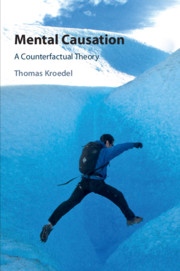The mind makes a difference to the physical world. Therefore, the mind causes things to happen in the physical world. You opened this book because you found it interesting (I assume with a bit of self-flattery). When you opened the book, your fingers moved in a certain way. If you had not been interested, your fingers would not have moved in this way. Thus, your interest caused your fingers to move the way they did. Your mind had a physical effect because it made a difference to what was going on in the physical world.
If we think about the relation between the mind and the physical world in this way, we can solve a number of difficult problems. We can explain how the mind and the physical world can interact in principle. We can explain how certain physical effects can have both physical causes (such as certain events in your brain when you opened the book) and mental causes. Moreover, we can explain these things even if the mind is not itself physical. Or so I argue in this book.
A number of people’s minds have made a difference to the book. I am indebted to Sebastian Bender, Ralf Busse, Jeremy Butterfield, Catharine Diehl, Daniel Dohrn, Antony Eagle, Luke Fenton-Glynn, Wolfgang Freitag, Jan Gertken, Nick Haverkamp, Christopher Hitchcock, Vera Hoffmann-Kolss, Franz Huber, Andreas Hüttemann, Romy Jaster, Geert Keil, Beate Krickel, Rory Madden, Erasmus Mayr, Beau Madison Mount, Christian Nimtz, Tobias Rosefeldt, Paolo Rubini, Thomas Sattig, Jonathan Schaffer, Stephan Schmid, Markus Schrenk, Moritz Schulz, Wolfgang Schwarz, Barbara Vetter, Lisa Vogt, Ralph Wedgwood, Timothy Williamson, to two anonymous readers for Cambridge University Press, to various further anonymous referees, and to audience members at talks where I presented materials from this book for helpful comments and suggestions. Thanks also to Hilary Gaskin, my editor at Cambridge University Press, for her help and support, and to Mairi Sutherland for her astute copy-editing. I am grateful to the Humboldt University of Berlin, where an earlier incarnation of this book served as my Habilitationsschrift, for teaching leave during the winter term of 2013–14.
Chapters 1, 2, and 3 draw on my ‘A Simple Argument for Downward Causation’, Synthese 192 (2015), and Chapters 1, 2, and 4 draw on my ‘Dualist Mental Causation and the Exclusion Problem’, Noûs 49 (2015). Thanks to Springer and Wiley-Blackwell for permission to use this material.

